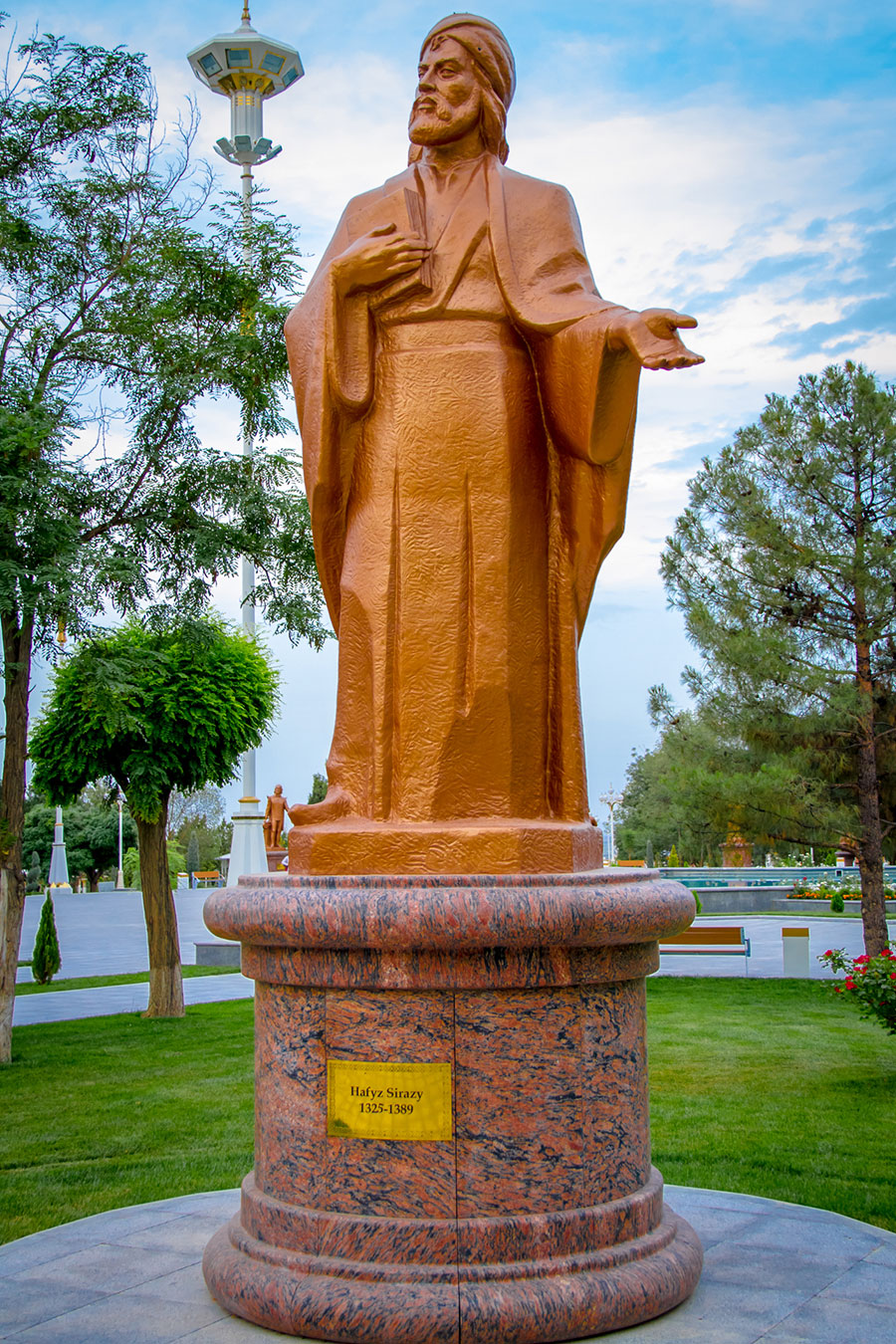This year, in a solemn atmosphere in commemoration of the 300th anniversary of the birth of the classic of Turkmen literature, Makhtumkuli Fragi, and in his honor, a new cultural and park complex of the capital was opened in the foothills of the Kopetdag. It is symbolic that this large-scale object, in addition to the majestic monument to Magtymguly, includes an alley of famous poets and thinkers from different countries and eras, which emphasizes its significance in the context of friendship between peoples and the unity of the cultural heritage of mankind.
There are 24 monuments to world-famous writers and poets from different countries of the world installed on the territory of the park complex. The editors of the "Golden Age" considered it right, if possible, to acquaint the reader, especially children and adolescents, with the life and work of outstanding personalities whose monuments adorn the Magtymguly Alley. This is also important because some of the geniuses of their time presented here visited Turkmenistan. "GA", publishing information about them, does not pretend to fully cover the materials about this or that person, especially since not much information has been preserved about many of them after a long period of time.
Our short story today is about the classic of the Iranian people, the poet Hafiz Shirazi.
Shams al-Din Muhammad Hafiz (Hafez) Shirazi is a Persian poet. In his homeland, his works are considered the pinnacle of Persian literature. His poems are classics of Persian poetry.
He was born in Shiraz, the family of the future poet was not noble and not rich, but he managed to get a full theological education. Already at an early age, he memorized the Koran, for which he received the respectful nickname "hafiz" ("keeping in memory").He was also familiar with the works of Rumi and Saadi, as well as Attar and Nizami, from an early age. As a child, he worked in a bakery, but combined work with studies at a maktab. He presumably received a good education in a madrasa. At the age of 21, he began to compose poetry and became a poet.
Hafiz got married in his declining years and had two children. Hafiz lived very poorly, experiencing constant need. Several times, the poet received invitations from foreign rulers to visit their countries, but the trips never took place.
Hafiz died in Shiraz, where he lived his entire life. Most modern authors believe that he died in 1390, although there is also an opinion that it happened a year earlier. He was buried in the Musalla Garden in Shiraz.
After Hafez's death, a collection of his poems, the Divan, was published. In 1928, a relatively early copy of the Divan was found in Iran, created 35 years after Hafez's death. The two most famous modern editions of Hafez Shirazi's Divan were compiled by Muhammad Ghazvini and Qasem Shani (495 ghazals) and Parviz Natel-Khanlari (486 ghazals).
The philosophical thought in the lines of Hafiz follows the path laid by Khayyam and Rumi, while being distinguished by its individuality. Hafiz was familiar with some of the literary heritage of his country.
Hafiz's main stanza was the ghazal. Many ghazals, branding malice, wars, the stupidity of fanatics and the crimes of those in power, show that Hafiz was not afraid of the difficulties of life and that his call for joy is an expression of an optimistic outlook on the world.
The poet's love lyrics are rich and deep. According to legend, Hafiz was in love with the girl Shah-Nabat (Shahnabot), many poems are dedicated to her. The simplicity in expressing the most intimate feelings and the sophistication of images make these ghazals of the poet the best examples of world love lyrics.
Hafiz saw a lot of evil, violence and cruelty in the world. The dream to rebuild the world anew sounds more than once in Hafiz. In the original, the poems of Hafiz are extremely melodic, they are easy to sing.
In Iran today, the Divan has been reprinted more times than any other classical work. The complete translation of Hafez into German, published in 1814, inspired Goethe to create his West-Eastern Divan, in which he dedicated the entire second book to Hafez, which he called the Book of Hafez.
Pushkin in his poem "Do not be captivated by military glory, O handsome young man!" ("From Hafiz") paid tribute to the poet and all Persian poetry. The works of Hafiz Shirazi have been translated into many languages of the world. The Mausoleum of Hafiz is one of the main sights of Shiraz. The Mausoleum is located in a park, where the poems of Hafiz are constantly recited to music. Fortune-telling on the "Divan" of Hafiz is also common. On the tombstone, the beyt of Hafiz is carved.








